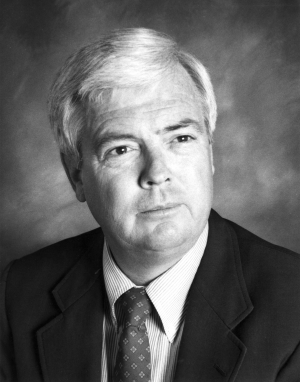Dolan led Waisman Center in two decades of growth
Terrence R. “Terry” Dolan, former director of the University of Wisconsin–Madison’s Waisman Center and professor in the Departments of Neurology and Psychology at UW–Madison, passed away Dec. 11 at age 80. He is survived by his wife Mary Ann, their four grown children and their families.
“Terry left a big imprint on the Waisman Center,” says Marsha Mailick, Waisman Center director from 2001 to 2014 and emeritus vice chancellor for research and graduate education. “He set the goal of expanding the Waisman Center building and recruited new faculty to the center, many of whom continue their research at Waisman today.”

Terry Dolan
Dolan was instrumental in the planning and development of the center’s $25 million, 71,000-square-foot addition that was completed in 2001. The expanded facility included laboratories dedicated to stem cell and gene therapy research along with the addition of a biomanufacturing facility, a brain imaging center, and new and remodeled space for the Waisman Early Childhood Program.
Dolan’s professional career began as a sportswriter in Mitchell, South Dakota, while he pursued a bachelor’s degree in psychology at Dakota Wesleyan University. He continued his studies at Trinity University, where he completed a master’s in physiological psychology in 1963. Dolan received his doctorate in 1966 in an interdisciplinary program of psychology, physiology and anatomy at the University of Texas at Austin. He was a postdoctoral fellow at Indiana University’s Center for Neural Sciences from 1966 to 1968, and remained there as a research associate for two more years.
From 1970 to 1976, Dolan was affiliated with Loyola University Chicago, where he held positions as professor of psychology and assistant dean of the graduate school. He also served as director of Loyola’s Parmly Hearing Institute. He left Loyola to direct the National Science Foundation’s Sensory Physiology and Perception Program in Washington, D.C., followed by a year in Germany as an Alexander von Humboldt Fellow.
Dolan was appointed director of the Waisman Center in 1982. During his 20-year tenure, he fostered significant research accomplishments and growth, and broadened behavioral research in speech and language sciences and in the areas of aging, sensory and perceptual processes. Dolan also expanded the center’s research on neurodegenerative diseases and the emerging fields of stem cell biology and gene therapy.
Dolan facilitated key partnerships between the Waisman Center and the public and private sectors. Most notably, he established the center’s Board of Visitors in 1996 with Judith Ward, who served as executive associate director. Today, the board continues to provide perspective and important connections with the business community and public policy makers, serves as an advocacy network, and guides major fundraising efforts for the center.
During his time at the Waisman Center, Dolan served in leadership roles at the national and international levels, including president of the International Association for the Scientific Study of Intellectual and Developmental Disabilities and the Association of University Centers on Disabilities. He was a trusted advisor on intellectual and developmental disabilities and worked with a broad range of organizations such as the Joseph P. Kennedy, Jr. Foundation and Special Olympics.
In February 2001, with Mailick as acting director of the Waisman Center, Dolan began a leave of absence to assist in building the Prince Salman Center for Disability Research — a national research center on childhood diseases and disabilities in Saudi Arabia. While guiding the establishment of the new center as its executive director, Dolan also worked as principal scientist at the King Faisal Specialist Hospital and Research Centre in Riyadh. He chronicled his experiences in Saudi Arabia in his book, “Children of the Kingdom: Bridging Genetics and Islam to Save the Newborns of Saudi Arabia.”
Upon his return from Saudi Arabia, Dolan retired from UW–Madison on May 24, 2002, exactly twenty years after he began.
“When Terry left his position as director of the Waisman Center, the program was very different than when he arrived 20 years earlier,” Mailick says. “This was due in large part to his leadership and the goals he set. He aimed high and achieved a great deal.”
Tags: obituaries, Waisman Center




